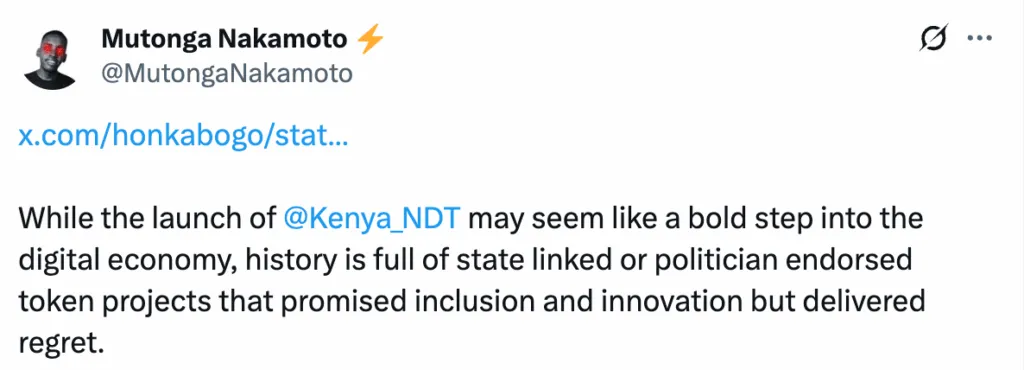The Kenyan government has endorsed a new “national digital token” that claims to be built to empower a new generation of citizens.
The Kenyan Digital Token (KDT) launched recently as a “civic token designed for community engagement, celebrating Kenya’s national identity, inspiring technological progress, and inviting global participation in Kenya’s future.”
Despite its nationalistic undertones, KDT was developed by a private entity without direct links to the government. Its white paper states that the token is “non-political in nature” and is not affiliated with or supported by the Kenyan government. It’s also not a tool for government participation or a form of civic identification.
Kenyan government endorses KDT
While the white paper distances the token from the government, the Kenyan Cabinet Secretary for Information, Communications and the Digital Economy, William Kabogo, has endorsed it as “an example of a project driving growth in the digital economy.”
KDT “will reflect the growing confidence in tokenization as a tool for value exchange, inclusion and innovation,” Kabogo stated in a message posted on social media.
The token “aligns closely with our broader national vision, anchored in our Virtual Assets Service Providers Bill, to build a transparent, secure and well-regulated virtual asset ecosystem,” he added.
On its website and social media channels, KDT pushes a similar message.
“It offers a tech-driven platform for investors to engage with the country’s growth, while providing citizens with financial inclusion and new opportunities once out of reach,” the project claims on the website, while describing KDT as “the first token for an entire digital nation.”
It further claims that its development treasury will channel its proceeds to national infrastructure upgrades, issue tech grants for Kenyan youth, and provide digital skills for the next generation.
The website is also filled with rhetoric that mirrors the ruling government’s messaging of “increase bandwidth” and “reduce latency.”
KDT has a hard cap of 1 billion tokens, with 60% allocated to “Kenyan citizens,” who must connect their X accounts to claim the tokens.
In his statement, Secretary Kabogo said that the token “speaks directly” to the heart of the ruling administration’s economic transformation agenda, “which empowers youth, drives economic dignity and embraces technology to unlock opportunity.”
Some industry leaders have expressed skepticism at the project and its association with the government. Mutonga Nakamoto, the founder of Bitcoin Nairobi, noted that most state-linked digital asset projects have ended up as costly flops.

Crypto + government = chaos
While KDT has received the endorsement of the Kenyan government, it’s not an official national project, and rightly so, as every time digital currency and the state team up, it ends in chaos.
Earlier this year, one such crypto-state pairing almost led to the impeachment of Javier Milei, Argentina’s eccentric president. Milei’s post on X in February promoted $LIBRA, a digital currency project he claimed would fund small businesses in Argentina.
The post catalyzed a meteoric, albeit very short-lived, price rise for the project’s token. At one point, it hit $4 billion in market cap, before it all came crashing down as early buyers dumped on the market.
Despite deleting the post just hours later and distancing himself from the project, Milei faced impeachment calls, and a judge was appointed to investigate fraud claims. He has since then been cleared of the charges.
Around the same time, Milei endorsed $LIBRA, President Faustin-Archange Touadera launched a national memecoin for the Central African Republic (CAR). Unlike Milei, Touadera stood behind the project, claiming it would unite his people and support national development.
His backing pushed the memecoin to $900 million in market cap in a day. However, red flags were quickly spotted; for starters, his promotional video for the token was flagged as AI-generated, while the website domain and X accounts were found to have been created shortly before the launch. Scam claims ensued, and just as quickly as it had ascended, the memecoin collapsed, losing over 95% of its value. Blockchain sleuths later revealed that 76% of the tokens were held by just four wallets.
U.S. President Donald Trump is the only leader who seems to have defied this trend. His $TRUMP memecoin is now the fifth largest, and while its market cap has dipped 78% since its peak on inauguration day, it still commands a $1.9 billion market cap. However, $MELANIA, his wife’s memecoin, has shed 90% of its value since the January 20 all-time high.
Watch: BSV, tokens, and the Metanet with Elas founders
title=”YouTube video player” frameborder=”0″ allow=”accelerometer; autoplay; clipboard-write; encrypted-media; gyroscope; picture-in-picture; web-share” referrerpolicy=”strict-origin-when-cross-origin” allowfullscreen=””>